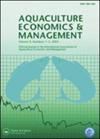Effects of open water availability on productivity and efficiency of tilapia fish farming
IF 3.7
2区 经济学
Q1 AGRICULTURAL ECONOMICS & POLICY
引用次数: 4
Abstract
Abstract Intensive pond aquaculture production is increasing and playing a major role in global aquaculture production, especially in developing countries. Empirical evidence shows that the access to and exchange of fresh water in tilapia pond aquaculture is important for making pond production ecologically more sound, efficient and productive. This study investigates productivity and efficiency differences between farms with access to open water resources and farms without access using data obtained from 311 interviews with tilapia farmers in Bangladesh. Propensity Score Matching (PSM) and meta-frontier DEA have been employed to estimate productivity and efficiency differences between the groups. Results show that farms located in areas with access to open water resources are significantly more efficient, but a bit surprisingly less productive than farms located in areas with deficit access to water resources. Furthermore, output could be increased by 29% and 40% without increasing input in areas with good access and limited access to water, respectively. Thus, promoting intensive aquaculture pond production in areas with access to water resources should focus on how to increase productivity, while areas with limited access should focus on optimal use of input in order to improve water quality and efficiency.开放水域可用性对罗非鱼养殖生产力和效率的影响
集约化池塘养殖生产正在增加,并在全球水产养殖生产中发挥着重要作用,特别是在发展中国家。经验证据表明,罗非鱼池塘养殖中淡水的获取和交换对于使池塘生产在生态上更加健全、高效和高产具有重要意义。本研究利用对孟加拉国311名罗非鱼养殖户的访谈数据,调查了获得开放水资源的养殖场与无法获得开放水资源的养殖场之间的生产力和效率差异。使用倾向得分匹配(PSM)和元前沿DEA来估计组间的生产力和效率差异。结果表明,与水资源匮乏地区的农场相比,位于开放水资源可及地区的农场效率显著提高,但生产率却低得令人惊讶。此外,在水资源获取良好和有限的地区,在不增加投入的情况下,产量可以分别增加29%和40%。因此,在可获得水资源的地区促进集约化养殖池塘生产应侧重于如何提高生产力,而在可获得水资源有限的地区应侧重于优化使用投入,以提高水质和效率。
本文章由计算机程序翻译,如有差异,请以英文原文为准。
求助全文
约1分钟内获得全文
求助全文
来源期刊

Aquaculture Economics & Management
FISHERIES-
CiteScore
7.30
自引率
17.90%
发文量
21
期刊介绍:
Aquaculture Economics and Management is a peer-reviewed, international journal which aims to encourage the application of economic analysis to the management, modeling, and planning of aquaculture in public and private sectors. The journal publishes original, high quality papers related to all aspects of aquaculture economics and management including aquaculture production and farm management, innovation and technology adoption, processing and distribution, marketing, consumer behavior and pricing, international trade, policy analysis, and the role of aquaculture in food security, livelihoods, and environmental management. Papers are peer reviewed and evaluated for their scientific merits and contributions.
 求助内容:
求助内容: 应助结果提醒方式:
应助结果提醒方式:


